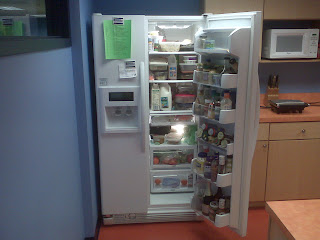I open the kitchen refrigerator and BANG, ohmigosh, SO-MUCH-STUFF.
I swear, people here stockpile plastic to-go containers and half-drained salad dressing bottles like it’s a food museum or something.
Refrigerators, in general, give me mild anxiety. I have nightmares about other people’s refrigerators. And office refrigerators, well, they are enough to send me into a meltdown. Leftovers, especially, drive me crazy. In my house, if leftovers are not consumed within one or two days, I throw them out—I don’t ask what belongs to who or whether someone wants the three remaining bites of shrimp Pad Thai—toss, grind, flush, whatever—gone. I’ll clean other people’s refrigerators, too, if they let me. My boyfriend’s fridge, in true bachelor form, was a collection of expiration dates when we first met. Oh boy did I overhaul his condiments, tossed out the old and replenished with up-to-the-minute bottles of mayo, mustard, ketchup, hot sauce and salsa.
Why do we need all this stuff anyway? I can’t remember the last time I used the yellow plastic squeeze-lemon (bought in case of emergency) or the sweet-and-sour sauce or the cocktail sauce or the tartar sauce or the eggplant rémoulade. It all just sits there, waiting and waiting.
I found a blog called Experiments in Efficiency. The blogger discusses her life without a refrigerator (aka bliss).
Perhaps I am getting carried away here, but what do you guys think, could you live without a fridge?


The poll is pretty fascinating! Not one of us (out of six--myself included) has said that we could or even maybe could go without a fridge. This brings up a question for me: How radical is too radical for changing your behaviors? Are we only willing to change our behaviors if they impose a slight inconvenience--as opposed to a complete overhaul of how we live our lives?
ReplyDeleteI just went five days without a fridge - involuntarily. When I returned home from the weekend intensive, our the refrigerator part of our fridge, not the freezer, wasn't working. Andrew had saved what he could in a Coleman cooler, which he was keeping outside the back door so it would stay cold. After two days of walking downstairs and through the basement to access perishables, I brought the cooler upstairs and packed frozen food around the milk, cheese, eggs and butter. The cooler wasn't always cool inside, leading me to question the health of eating some of its contents.
ReplyDeleteNow, I like camping and roughing it, living without modern conveniences every so often. But the refrigerator -- this impotent monolithic contraption standing in the corner of my kitchen -- just seemed to be mocking me. Rather than living life more simply by following a European tradition of shopping each day for that day's meals, my family and I resorted to eating out quite a bit, which was not too healthy and way too expensive to sustain. We also ended up throwing away leftovers rather than bringing them home because we had no where to put them.
Picking refrigerators as an indicator of environmental sustainability or citizenship is interesting. What would we do with all the locally grown organic produce that we get from our CSA or backyard garden if we didn't have refrigeration? Where would I hang my kids' artwork, family photos and silly magnets? Where would I turn for those nightly ice-cream cravings? No, I'm not willing to give up my fridge just yet, unless someone points out how I'm greatly reducing my carbon footprint, curbing global warming, and making the world a better place.
For another low-impact living experiment, check out www.littlebrowndress.com
You bring up a good point, Dawn, about the size of refrigerators. Here in the UK, the refrigerators are typically much smaller. Therefore, we just don't have the room to buy a week or more worth of food. We buy smaller quantities and shop more often. I imagine there's a double benefit in terms of energy use and encouraging fresh food purchasing.
ReplyDeleteDawn-- Thanks for responding!
ReplyDeleteYes, a great point about refrigerator size. I remember living in Italy for a year during college in an apartment with three other roommates. Our fridge was TINY. As a result of the space constraint, we only could buy what we needed. No more.
This resulted in some serious thought and planning, but in the end, the European way taught us about consumption, sharing and community.
The four of us would work together and plan our meals-- Myriah would make pasta on Monday, Julia would create a chicken dish for Tuesday, etc. We only kept a few perishables in the refrigerator-- milk, cream, cheese-- and everything else we brought in fresh from the bountiful street market.
It is hard to shop without over shopping, but the Europeans have mastered the art and its a minimal and conscious way to live (and eat!).